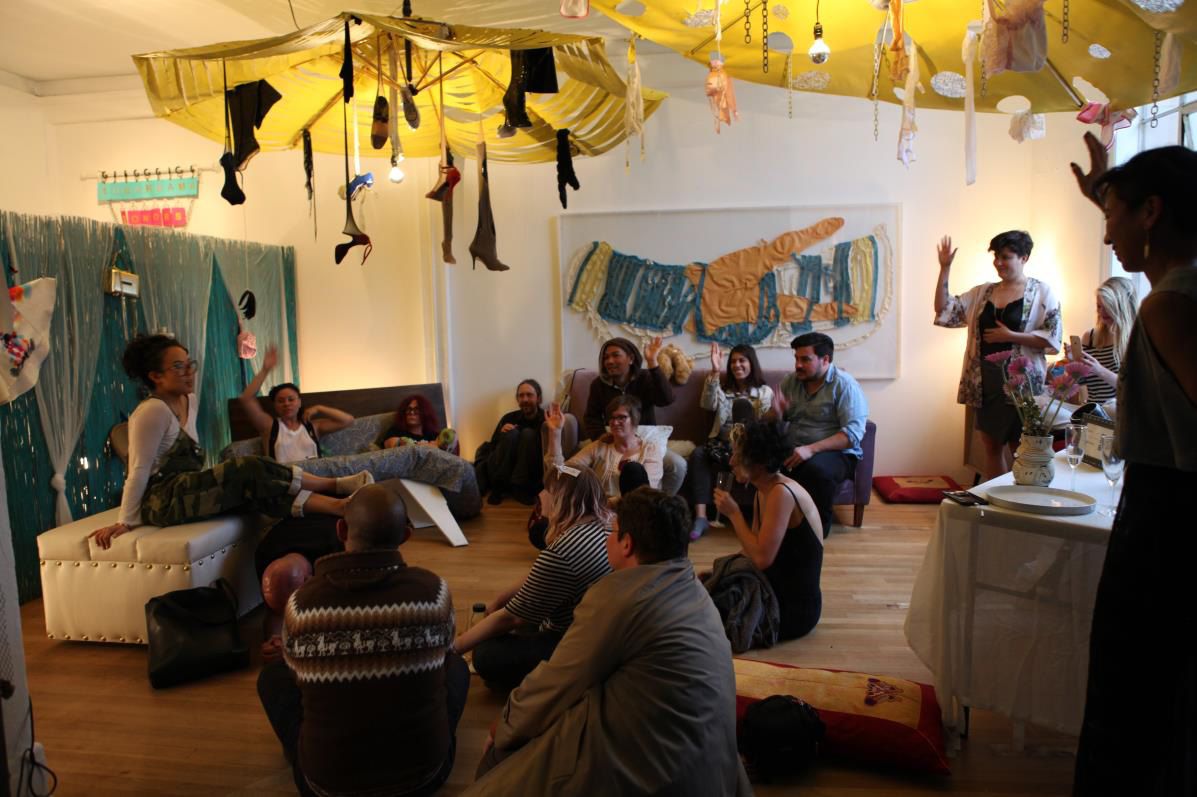This essay by Lucy Kahn was originally published as the First Place finalist in Slixa’s call for entires on the subject of FOSTA/SESTA. MERRY JANE is republishing the top three entries with the publication and author’s permission.
Right now, I’m supposed to be writing about the effects of FOSTA/SESTA, a pair of bills that passed into law last year. Supposedly the bill is supposed to curb sex trafficking by making websites that publish sex worker ads accountable for the content uploaded by their users. In this way, sites like Backpage, Eros, and Craigslist personals can be criminally charged with aiding in prostitution and sex trafficking due to the content from user posts. Out of the three sites mentioned above, two are now defunct: Backpage being seized by the FBI, and Craigslist shutting down its personals section as a preemptive strategy. Since no one wants to be arrested on charges of felony pandering this law encourages self censorship from Internet platforms sex workers have traditionally relied on to meet our clients. So I’m supposed to be writing about this piece of legislation, but instead what I want to do is tell you about my life, and tell the story of how I came into sex work, the blessings this career has brought into my life, and how FOSTA/SESTA has affected my life and community.

Author as a baby Domme, 2012
I am not special, nor am I an exception to any rule—the forces that govern my life and affect my personal agency are the same ones that affect others. Yes, I am a sex worker—and at the same time I am a daughter, a sister, a teacher, an immigrant, a partner, a pet-owner, an Internet user, a US citizen, a woman, a queer person, a, voter, and an artist. Each of us affected by this bill are multi-faceted beings leading complex and interwoven lives at the intersections of many identities and demographics. While currently the impact of FOSTA/SESTA is felt most acutely by those of us participating in the commercial sex trade, this bill affects everyone—sex workers are just the canaries in the coal mine trying to make our warning call before it’s too late.
Throughout my life, I’ve worked in the service industry in many capacities: in restaurants as a hostess and server, in sales for black box theaters and film festivals, and in bars as a cocktail waitress. Raised by a single mom who immigrated to the US from China, money was always tight and I learned from a young age that one’s independence is strongly tied to one’s ability to make her own means. I got my first job delivering newspapers at age 13. Waking up before dawn and filling my smock with an absurdly heavy load, I walked from house to house slowly lightening the extra weight distributed across my torso one stoop at a time. The worst was when the spring rain would fall and I would have to tiptoe around the wriggling mass of worms on the sidewalk, doing my best to not squish them with my every step. Whether delivering papers, writing grants, sucking dick, or working the pole, every job requires a bodily commitment.
One glaring problem of FOSTA/SESTA is that the wording of the bill does not distinguish between consensual and non-consensual forms of sex work. This not only makes it ineffective at achieving its stated goal—to stop sex trafficking—but also compromises the ability of us consensual sex workers to survive economically. In fact, in its short life, we’ve already seen it having the opposite effect of encouraging sex trafficking. After the shutdown of Backpapge, I’ve had friends solicited by strangers online who offer to “help get them work”—ostensibly, 3rd party middlemen or pimps with their own client networks.
In addition to affecting the sex worker community, this legislation is also a huge step in ending net-neutrality, and heavily restricts freedom of speech on the Internet from a moralizing stance. Taking away the ability of individuals to communicate directly with one another through low cost user-to-user platforms, this bill centralizes the power of the Internet in the hands of the government, taking us down a slippery slope paved by the country of my birth, China. In China, there is no Google, there is no Facebook, Tumblr or Twitter, and yet there is still sex trafficking.
While in grad school, I met a friend of a friend at a birthday party who told me she worked as a dominatrix. She chatted easily about peeing on clients, administering cock and ball torture, getting her feet worshipped, and all the while getting paid for it. The next day I Googled something like “Dungeon dominatrix los angeles”. It was through this search that I first encountered Backpage. Backpage.com is where I met my BDSM mentor. Through my training with her, I was able to work according to my own schedule, develop new skills, gain confidence, practice how to assert myself, and finish my graduate degree debt-free. After she moved away, I used the skills learned from this initial experience to post my own ads, build a website, rent in-call locations, and start working for myself.
After graduating, I became independent at a time where I saw my former classmates taking menial jobs, doing manual labor, and generally being underpaid and underemployed. In addition to funding my basic needs like rent, food, and transportation, being able to post ads easily and cheaply afforded me the opportunity to travel through my work. Now that FOSTA/SESTA has been voted into law, I’ve literally seen my advertising platforms disappear before my eyes. Now, I’m forced to maintain an Internet presence mainly through Twitter and Instagram, which are inconsistent in their attitude towards sex workers, often shadow banning or outright closing our accounts without warning. In this precarious landscape, one has to always walk the line between enticement and discretion, and I’ve been the pool of my new clients both drop in quantity and lower in quantity. In a context where explicit negotiation makes you a target for persecution, I’ve had to remain vague about my protocol, which results in many time-wasting inquiries.
“By having financial agency through my BDSM work , I was able to dictate the terms of my own labor.”
Before last year, is no exaggeration to say that Backpage single-handedly allowed me to create freedom for myself. By having financial agency through my BDSM work , I was able to dictate the terms of my own labor. While I still engaged with my art practice simultaneously, I became increasingly aware of the inequity and unethical practices that considered business as usual in that field. Agreements are vague and often made verbally, artists were often not compensated for the sale of their work, and the power dynamics were skewed in a way that facilitated, if not encouraged, the abuse of gallerists’ financial leverage over artists. Unsurprisingly, these economic inequalities are compounded with race and gender factors—making those who are not cis white male artists even more vulnerable to the financial pitfalls of the art market, not to mention targets of sexual harassment. One only has to look at who was implicated in the #MeToo movement to see that many art world shot- callers were all too willing to abuse their disproportional power at the expense of others.
These kinds of abusive labor practices are not unique to the art world, of course—it is simply one case study I have lived experience of, and am sure others can speak to similar practices in the fields of music, dance, entertainment, and beyond. While we as a society are working towards our responsibility to rectify these underlying structural issues—in the meantime, those of us living in the here and now must develop strategies for our personal survival. The financial independence sex work afforded me allowed me to have a layer of protection against the desperation engendered by these kinds of structural issues. Knowing I had food in the fridge and rent in the bank allowed me to be intentional about who I did and did not work with in my other career. In my community, I know many sex worker peers who were also pursing other career paths or high education at the same time. FOSTA/SESTA not only compromises full-time sex workers’ ability to survive, but it also compromises the ability of part-time sex workers to level the playing fields in other arenas in which they are participating.
When this bill passed last summer, I saw my community explode with despair and anxiety. All over Twitter, my feeds were filled with exchanges of information, questions regarding implementation, and potential workarounds to the new law. It seemed that it was the singular thing on everyone’s mind! Outside of the sex worker community through, it was startling to realize that none of my civilian friends had even heard of FOSTA/SESTA, not to mention how it could eventually affect them as well. Seeing that they had no knowledge of the bill nor the potential long ranging effects of this bill, I hosted a conversation in a local art space to help raise awareness outside of the sex worker community. Seeing this disparity in awareness was an eye-opener for me—that the folks who are normally so engaged in humanitarian concerns had zero exposure to this particular bill that EVERYONE in the sex worker community was talking about showed me how little is sex worker rights are taken into account in even liberal discussions of human rights.

SESTA/FOSTA info session at Visitor Welcome Center, Los Angeles, 2018
Within the sex worker community, I started attending sex-worker meetings to discuss what we could do to protect ourselves post FOSTA/SESTA. Although this legislation negatively affects us, one positive aspect that resulted from it is that I saw our community come together in a way that I had never seen before. Sex workers of all capacities showed up to discuss tactics, share knowledge, and foster peer-to-peer connections. For the first time, I felt like part of the sex worker community in a concrete way, and was galvanized to help advocate for our human rights. It in this wave of collective mobilization that I began getting involved with SWOP-LA.
As a branch of SWOP-USA, the grassroots organization that works to end violence and discrimination against sex workers on a national level, the Los Angeles branch of SWOP has built a tremendous amount of momentum since the passing of this bill. When I had attended meetings back in 2014, attendance was in the single digits, and it was difficult to get on the mailing list and/or find opportunities to volunteer and contribute. Over the last year, however, the energy of SWOP-LA has totally shifted and the collective drive is palpable. With a new website, active social media presence, peer-to-peer support groups, and monthly community meetings, separate committees for services, fundraising, outreach, politics, and public relations have been established by a leadership that is majority sex worker. With other community members and allies ranging from medical students, public health advocates, social workers, and DSA organizers often in attendance at meetings, it feels like a true coalition is coalescing in this emergent organization.
Having participated personally in one of their recent fundraising events called the Art of the Act, which showcases the art of sex workers, I see the organization’s intersectional approach to advocating for human rights as its major strength. If selected for a Slixa award, I would like to name SWOP-LA as my advocacy organization of my choice. With so much potential demonstrated in just the last year, I know that additional funding from Slixa would go far towards doing this important work for our community.











